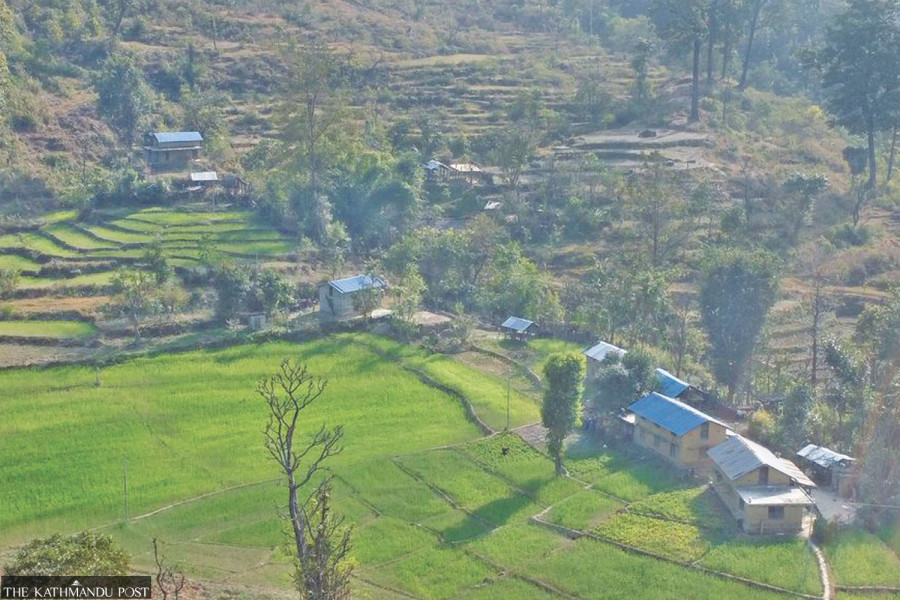Karnali Province
Rising wildlife attacks forcing residents to flee villages bordering Banke National Park
In Salyan’s Kaprechaur village of around 500 households, over 350 have applied for migration permission.
Biplab Maharjan
Tila Rana, a 40-year-old woman from Ambas settlements in ward 7 of Kalimati Rural Municipality, is planning to migrate due to the constant threat of wild animal attacks.
“Despite no fatalities, more than 50 people have sustained injuries within a year. Also, nobody in the settlement rears cattle or livestock due to the threat of wild animals. Life here is very difficult as crops are damaged by monkeys and boars, and there is always the risk of being attacked by tigers and bears,” said Rana.
Due to human-animal conflict, the locals of four settlements in ward 7 of Kalimati Rural Municipality, which borders the Banke National Park, are migrating to safer places.
Locals of Ambas, Bherikuti, Gahakhane, and Magare in ward 7 of the rural municipality are leaving due to increasing fears of attacks by wild animals such as tigers, bears, and wild boars from the nearby Banke National Park.
The Mankamana Basic School in Ambas remains closed due to a lack of students following the exodus of local residents.
Wild animals often enter the settlements attacking livestock such as cows and goats, while wild boars and monkeys wreak havoc on seasonal crops.
According to Mitralal Rijal, the chairman of ward 7 of Kalimati Rural Municipality, the proximity of the four settlements to the national park exposes them to constant risk of animal attacks. The locals have long struggled to survive in the area due to continuous destruction of fields by wildlife.
“A couple of years ago, there were 80 households in the Ambas settlement, but now there are only four left; similarly, there are only five households in the Bherikuti settlement, compared to 60 previously. There were 27 households in the Gahakhane and Magare, but the whole settlement is empty now due to the fear of wild animals,” said Rijal.
Before the Banke National Park was established in 2010, people used to travel to Nepalgunj by walking through the forest due to lack of motorable roads. At that time, even though there were wild animals, there were no tigers. But after the forest was declared a national park, a tiger conservation campaign started, resulting in terror in the vicinity.
Apart from the four affected settlements, Kaphrechaur, which lies in ward 7 of Kalimati Rural Municipality, has started to suffer from animal terror.
There are around 500 families in Kaphrechaur, and all are planning to migrate to someplace safe because cases of attacks by tigers and bears have increased in the past couple of years.
According to Rijal, there are around 500 families living in Kaphrechaur, and more than 350 have applied at the local unit seeking permission for migration due to the terror of wild animals, especially tigers and bears.
“Living and surviving near the national park has become extremely challenging these days because the government wants to boost the tiger population without ensuring human safety. More than a dozen people have been injured in Kaphrechaur in the past three years,” said Rijal.
Nandaram Oli, a local of Magare settlement, moved to ward 1 of Kalimati Rural Municipality five years ago after his house came under tiger attack twice.
“My six goats and a cow were killed by tigers, and I also got seriously injured once. For the safety of my family, I migrated from ward 7 to ward 1. The terror of wild animals during the night is unimaginable. The government is focussed on increasing the tiger population, but has neglected human safety,” said Oli.
Rijal said that people in ward 7 are living in terror because they feel powerless to prevent wild animal attacks.
“When a wild animal kills a human, it is called an accident, but when a human kills an animal, even in self-defence, they go to jail. The rural municipal office cannot help the locals due to the complex rules and regulations of the government aimed at protecting wild animals,” said Rijal.
According to the 2021 national census, there are 25 tigers in Banke National Park.




 15.12°C Kathmandu
15.12°C Kathmandu











